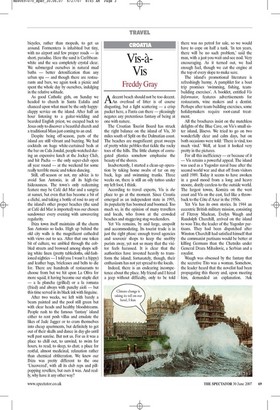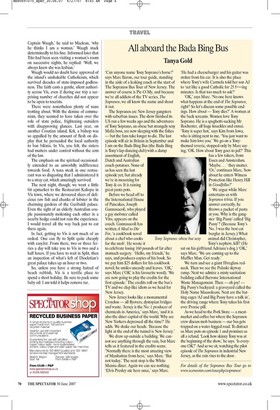ViS-a- ViS
Freddy Gray Adecent beach should not be too decent. An overload of litter is of course disgusting, but a light scattering — a crisp packet here, a Fanta can there — pleasingly negates any pretentious fantasy of being at one with nature.
The Croatian Tourist Board has struck the right balance on the island of Vis, 30 miles south of Split on the Dalmatian coast. The beaches are magnificent: great sweeps of pretty white pebbles that tickle the rocky toes of the hills. The little clumps of corrugated plastics somehow emphasise the beauty of the shores.
Inadvertently, I started a clean-up operation by taking home swabs of tar on my back, legs and swimming trunks. Three weeks on, there is still an oily tattoo under my left foot, I think.
According to travel experts, Vis is the place to go at the moment. Since Croatia emerged as an independent state in 1995, its popularity has boomed and boomed. Too much so, in the opinion of many travellers and locals, who frown at the crowded beaches and staggering stag-weekenders.
Yet Vis remains, by and large, unspoilt and accommodating. Its tourist trade is in just the right phase: enough travel agencies and souvenir shops to keep the snobby purists away, yet not so many that the visitor feels harassed. It is clear that the authorities have invested heavily to transform the island; fortunately, though, their enthusiasm has not yet spread to the locals.
Indeed, there is an endearing incompetence about the place. My friend and I hired a jeep without difficulty, only to be told there was no petrol for sale, so we would have to cope on half a tank. 'In ten years, there will be no such problem,' said the man, with a just-you-wait-and-see nod. Very encouraging. As it turned out, we had enough fuel, though we cut the engine at the top of every slope to make sure.
The island's promotional literature is refreshingly barmy. A pamphlet for a boat trip promises 'swimming, fishing, teambuilding exercises'. A booklet, entitled Vis Infomator, features advertisements for restaurants, wine makers and a dentist. Perhaps after team-building exercises, some holidaymakers require root-canal treatment.
All the brochures insist on the matchless delights of the Blue Cave, on Vis's small sister island, Bisevo. We tried to go on two wonderfully clear and calm days, but on both occasions were told: 'There is vind, too much vind.' Well, at least it looked very pretty in the pictures.
For all this inefficiency — or because of it — Vis retains a powerful appeal. The island was used as a Yugoslav naval base after the second world war and shut off from visitors until 1989. Today it seems to have awoken in a good mood from a long and heavy snooze, dozily careless to the outside world. The largest towns, Komiza on the west coast and Vis on the east, feel like a throwback to the Cote d'Azur in the 1950s.
Yet Vis has its own stories. In 1944 an eccentric British military mission, consisting of Fitzroy Maclean, Evelyn Waugh and Randolph Churchill, arrived on the island to woo Tito, the leader of the Yugoslav partisans. They had been dispatched after Winston Churchill had satisfied himself that the communist partisans would be better at killing Germans than the Chetniks under General Draza Mihailovic, a Serbian and a royalist.
Waugh was obsessed by the fantasy that the secretive Tito was a woman. Somehow, the leader heard that the novelist had been propagating this theory and, upon meeting him, demanded an explanation. 'Ask Captain Waugh,' he said to Maclean, 'why he thinks I am a woman.' Waugh stuck determinedly to his line. Informed later that Tito had been seen visiting a woman's room on successive nights, he replied: 'Well, we always knew she was lesbian.'
Waugh would no doubt have approved of the island's unshakable Catholicism, which survived decades of state-imposed godlessness. The faith casts a gentle, silent authority across Vis, even if during our trip a surprising number of churches did not appear to be open to tourists.
There were nonetheless plenty of nuns trotting about. With the demise of communism, they seemed to have taken over the role of state police, frightening outsiders with disapproving glances. Last year, on another Croatian island, Krk, a bishop was so appalled by the amount of flesh on display that he persuaded the local authority to ban bikinis In Vis, you felt, the sisters had matters under control without the arm of the law.
The emphasis on the spiritual occasionally extended to an unworldly indifference towards food. A tuna steak in one restaurant was so disgusting that I administered it to a stray cat, which amazingly survived.
The next night, though, we went a little bit upmarket to the Restaurant Kaliopa in Vis town, where we devoured slices of delicious raw fish and chunks of lobster in the charming gardens of the Garibaldi palace. Even the sight of an elderly Australian couple passionately molesting each other in a nearby hedge could not ruin the experience. I would travel all the way back just to eat there again.
In fact, getting to Vis is not much of an ordeal. One can fly to Split quite cheaply with easyJet. From there, two or three ferries a day will take you to Vis in two and a half hours. If you have to wait in Split, then an inspection of what's left of Diocletian's great palace takes up an hour or two.
So, unless you have a strong hatred of beach rubbish, Vis is a terrific place to spend a short holiday. Be sure to pack some baby oil: I am told it helps remove tar.



















































































 Previous page
Previous page